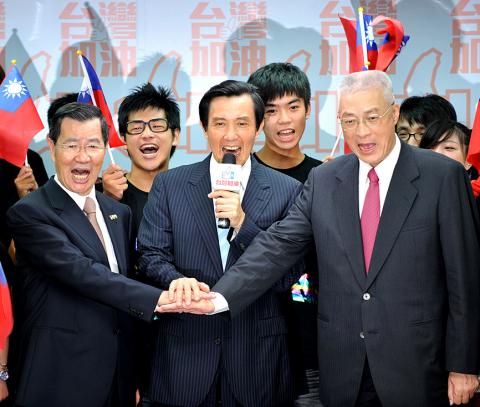President Ma Ying-jeou (馬英九) announced yesterday that Premier Wu Den-yih (吳敦義) would be his running mate in next year’s presidential election, adding that Wu would not need to step down as premier to engage in campaign activities.
Lauding Wu as a trusted premier whose administrative capabilities left him at ease, Ma told a news conference that he consulted a number of people on a possible running mate before tapping Wu, a decision he said would be to the country’s greatest benefit.
He said that as premier, Wu has demonstrated exceptional leadership and administrative capabilities that have helped improve the efficiency of the central government as well as the private sector’s competitiveness, helping it become one of the top 10 in the world in the past two annual IMD World Competitiveness Yearbook rankings.

Photo: Patrick Lin, AFP
Saying that Wu would not need to step down as premier for the time being, Ma added that he “would consider the matter in the future when it becomes necessary.”
Asked why he did not choose a person with a strong economic background as his running mate, Ma said his choice of the premier — a trained historian who has been a journalist and served as Kaohsiung mayor — did not mean he would ignore the country’s economic development.
“I will continue drawing on Vice President Vincent Siew’s (蕭萬長) expertise and experience in the economic field and will keep him on as a top economic planner in my new administration,” said Ma, who doubles as chairman of the Chinese Nationalist Party (KMT).
Siew was present at the news conference.
Wu likened his selection as the KMT’s vice presidential candidate to going to battle.
“A soldier has no right to choose his battlefield,” Wu said. “I’ll do my utmost to help President Ma achieve his re-election goal.”
Most KMT lawmakers welcomed Ma’s choice of Wu as running mate.
KMT Legislator Wu Yu-sheng (吳育昇) said the Ma-Wu ticket is the best possible team the party could field for the presidential race, adding that he believed Wu complemented the president in terms of their political personalities and characteristics.
KMT Legislator Hsieh Kuo-liang (謝國樑) said Ma and Wu have shown that they work well together, but cautioned that it remained to be seen if Wu’s addition to the ticket would boost support for Ma.
Democratic Progressive Party (DPP) Legislator Kuan Bi-ling (管碧玲), on the other hand, panned Wu’s selection as “lacking creativity” and reflecting the KMT’s lack of talent.
“The Ma-Wu ticket is so weak that voters will move their support away from it,” Kuan said.
DPP Legislator Gao Jyh-peng (高志鵬) said it was rare that a ruling party would launch its presidential campaign before the opposition did.
“Ma’s announcement today that he picked Wu as his running mate indicates that the KMT is really panicking over the 2012 presidential race,” Gao said.

A magnitude 5.6 earthquake struck off the coast of Yilan County at 12:37pm today, with clear shaking felt across much of northern Taiwan. There were no immediate reports of damage. The epicenter of the quake was 16.9km east-southeast of Yilan County Hall offshore at a depth of 66.8km, Central Weather Administration (CWA) data showed. The maximum intensity registered at a 4 in Yilan County’s Nanao Township (南澳) on Taiwan’s seven-tier scale. Other parts of Yilan, as well as certain areas of Hualien County, Taipei, New Taipei City, Taoyuan, Hsinchu County, Taichung and Miaoli County, recorded intensities of 3. Residents of Yilan County and Taipei received

Taiwan has secured another breakthrough in fruit exports, with jujubes, dragon fruit and lychees approved for shipment to the EU, the Ministry of Agriculture said yesterday. The Animal and Plant Health Inspection Agency on Thursday received formal notification of the approval from the EU, the ministry said, adding that the decision was expected to expand Taiwanese fruit producers’ access to high-end European markets. Taiwan exported 126 tonnes of lychees last year, valued at US$1.48 million, with Japan accounting for 102 tonnes. Other export destinations included New Zealand, Hong Kong, the US and Australia, ministry data showed. Jujube exports totaled 103 tonnes, valued at

BIG SPENDERS: Foreign investors bought the most Taiwan equities since 2005, signaling confidence that an AI boom would continue to benefit chipmakers Taiwan Semiconductor Manufacturing Co’s (TSMC, 台積電) market capitalization swelled to US$2 trillion for the first time following a 4.25 percent rally in its American depositary receipts (ADR) overnight, putting the world’s biggest contract chipmaker sixth on the list of the world’s biggest companies by market capitalization, just behind Amazon.com Inc. The site CompaniesMarketcap.com ranked TSMC ahead of Saudi Aramco and Meta Platforms Inc. The Taiwanese company’s ADRs on Tuesday surged to US$385.75 on the New York Stock Exchange, as strong demand for artificial intelligence (AI) applications led to chip supply constraints and boost revenue growth to record-breaking levels. Each TSMC ADR represents

TRUST: The KMT said it respected the US’ timing and considerations, and hoped it would continue to honor its commitments to helping Taiwan bolster its defenses and deterrence US President Donald Trump is delaying a multibillion-dollar arms sale to Taiwan to ensure his visit to Beijing is successful, a New York Times report said. The weapons sales package has stalled in the US Department of State, the report said, citing US officials it did not identify. The White House has told agencies not to push forward ahead of Trump’s meeting with Chinese President Xi Jinping (習近平), it said. The two last month held a phone call to discuss trade and geopolitical flashpoints ahead of the summit. Xi raised the Taiwan issue and urged the US to handle arms sales to